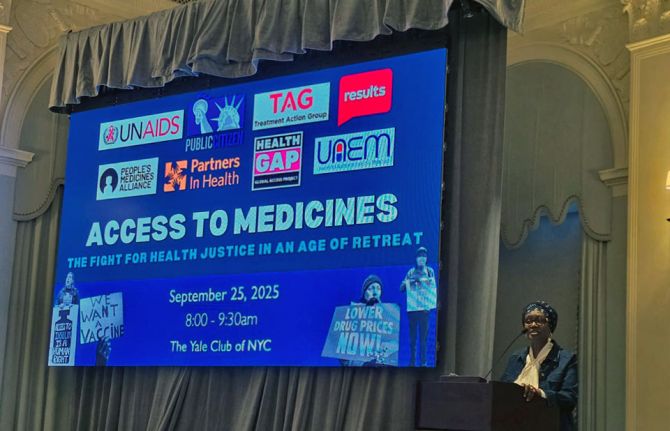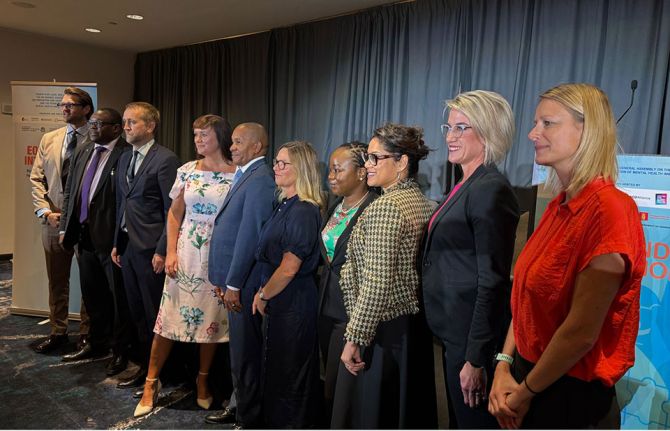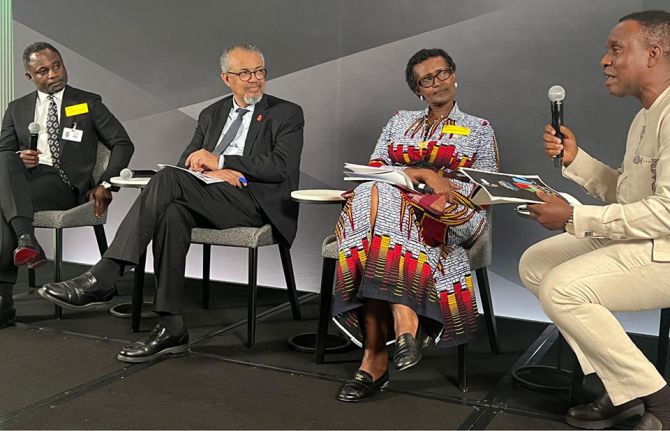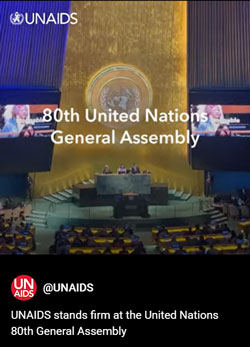




Press Release
UNAIDS stands firm at the United Nations 80th General Assembly
28 September 2025 28 September 2025GENEVA/NEW YORK, 27 September 2025—UNAIDS has wrapped up UNGA80 week with a productive mix of high-level events, announcements and decisions. The week kicked off with a face-to-face meeting of the esteemed members of the Global Council on Inequalities AIDS and Pandemics.
The group of experts, co-chaired by Nobel prize winning economist Joe Stiglitz, former First Lady of Namibia Monica Geingos, and Director of the Institute of Health Equity Sir Michael Marmot, met to review how inequality gaps within and between countries are impacting global health security.
Groundbreaking announcements were made on new deals to make generic versions of the long-acting injectable HIV prevention medicine, lenacapavir, available in 120 low- and middle-income countries at the price of just US$ 40 per person per year.
“This is a watershed moment in the fight to end AIDS as a public health threat. A price of $40 per person per year for a medicine which is almost 100% effective in preventing HIV with injections just twice a year is a leap forward that will help to unlock the revolutionary potential of long-acting HIV medicines,” said Winnie Byanyima, Executive Director of UNAIDS.
UNAIDS has been advocating for long-acting medicines to be affordable and available for people in most need since the studies were concluded. UNAIDS estimates that if 20 million people in highest need have access it would dramatically reduce new infections.
As part of these efforts and more, on the sidelines of UNGA80, UNAIDS and Africa Centres for Disease Control and Prevention signed a landmark memorandum of understanding to expand community health workforces, ensure access to quality and affordability HIV commodities, and strengthen Africa’s local manufacturing capacity of essential medicines to ensure sustainable HIV responses into the future.
UNAIDS is continuing to support countries including through active engagement in the Accra Reset, a pivotal initiative, launched by Ghanian President John Dramani Mahama at UNGA80, which introduces a bold framework that affirms Africa’s resolve to lead, own and sustain health systems. Ms Byanyima spoke at the launch saying, “We are here for health sovereignty, economic growth and a new era of African leadership. Getting there will require a whole-of-government, whole-of-society approach, empowering communities to lead.”
UNAIDS also launched a new short film featuring prominent global HIV advocates including Prince Harry, Duke of Sussex, Magic Johnson and Charlize Theron. In the film the advocates call on governments and donors to sustain life-saving investments to end AIDS, warning that hard-won progress against HIV is at risk of being reversed due to sudden and drastic funding cuts by donors.
UNAIDS participated in a number of events organized by the Nizami Ganjavi International Center (NGIC) as part of their High-level meeting on ‘Multilateralism on a Crossroads: Challenges and Pathways to Peace’.
“We may be in crisis, but we are not powerless,” said Ms Byanyima at the NGIC event on global health and pandemic preparedness. “We can break the inequality-pandemic-cycle. We can prepare for – and even prevent – the next pandemic. And we can take action to bring an end to ongoing pandemics like AIDS. As governments and leaders, there are tools you can use. I hope that you will.”
Just ahead of UNGA, two important reports were released, both with significant implications for the future of the AIDS response.
The first, a new US Strategy on Global Health, set out a tailored focus for the US to work closely with countries most affected by HIV and reaffirms the leadership from the US in the AIDS response and its continued commitment to saving lives through the US President's Emergency Plan For AIDS Relief.
The second, a progress report from the United Nations Secretary-General on structural reforms and programme realignments in which the Secretary-General puts forward a proposal to advance UNAIDS’ transformation timeline.
There was an outpouring of support for UNAIDS with around 900 organizations signing on to reaffirm UNAIDS current transformation plans. UNAIDS’ Board issued a statement reiterating that the governing bodies have the responsibility to determine the way forward.
UNAIDS has been working within the Secretary-General’s UN80 vision and has been advancing on its two-phase transition path, leading the way as the UN system reforms.
The first phase of transformation, currently underway, includes a 55% reduction in UNAIDS Secretariat staffing (from 661 to 294 staff). UNAIDS’ country presence is being consolidated from 85 to 54 countries, with a lighter footprint in 40 countries. Programmatic expertise is being relocated to regional hubs in Nairobi, Johannesburg and Bangkok and UNAIDS’ Geneva presence has been reduced by over 80%.
UNAIDS’ priority is to continue to support inclusive, multisectoral, and sustainable national HIV responses, led by governments and communities, and increasingly funded by domestic resources. AIDS is not over; the global AIDS response has been upended in recent months and much more needs to be done to achieve the SDG target of ending AIDS by 2030.
UNAIDS
The Joint United Nations Programme on HIV/AIDS (UNAIDS) leads and inspires the world to achieve its shared vision of zero new HIV infections, zero discrimination and zero AIDS-related deaths. UNAIDS unites the efforts of 11 UN organizations—UNHCR, UNICEF, WFP, UNDP, UNFPA, UNODC, UN Women, ILO, UNESCO, WHO and the World Bank—and works closely with global and national partners towards ending the AIDS epidemic by 2030 as part of the Sustainable Development Goals. Learn more at unaids.org and connect with us on Facebook, Twitter, Instagram and YouTube.

